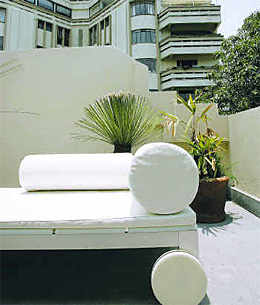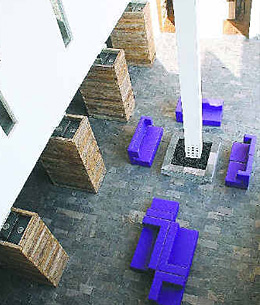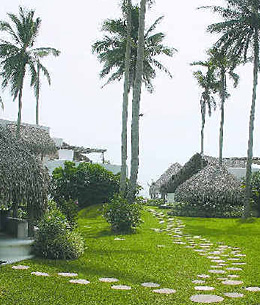 |
 |
 |
 Travel & Outdoors | August 2007 Travel & Outdoors | August 2007  
Hip Mexican Hotels Book Style and Comfort
 Laurence Iliff - The Dallas Morning News Laurence Iliff - The Dallas Morning News
go to original


| | Hippodrome boutique hotel in the Condesa neighborhood of Mexico City is a renovated 1931 art deco building. (Erich Schlegel/DMN) | 
| | La Purificadora's lobby has hip details such as signature purple furniture. (Alberto Romero Saucedo) | 
| | Hotel Azúcar, in secluded Montegordo, Veracruz, evokes the state's sugar plantations of the past. (Alberto Romero Saucedo) |
Montegordo, Mexico – This beach-rich, colonial country has long been about where to go: Cancún, Puerto Vallarta, indigenous haunts such as Oaxaca and Chiapas. Where to stay has taken second place.

Rafael Micha and his eclectic hotel group, Grupo Habita, have changed the equation with seven distinctive hangouts, including Azúcar in the sleepy Gulf Coast town of Montegordo.

And others are creating their own twists on the boutique concept, such as Tom Shortt, an American whose five-year labor of love, Hippodrome, brings intimate New York-style luxury to Mexico City.

Grupo Habita started the hip boutique trend in 2000 and hasn't made a misstep.

Here on the Veracruz coast, the stunning Azúcar (Sugar) resort takes fairly simple elements – 20 cabins, a beachside pool and an open-air restaurant – and transforms them into something special.

"Azúcar" was the trademark cry of Celia Cruz, the late Cuban-American salsa singer, and it conjures up sultry Caribbean nights and long, sunny days. And that's just how it feels in Veracruz, which is culturally similar to Cuba.

Hang in a hammock. Gaze out from a gazebo. Take a waterfall-like shower behind emerald glass before settling in front of a plasma television. Read on a beanbag chair.

Azúcar opened a year ago. The hotel evokes the hacienda concept that was reviled in post-revolutionary Mexico for its association with a feudal society. And that's deliberate.

"To revive the concept of the ingenio is almost pompous," Mr. Micha says, referring to a sugar plantation. He enjoys playing with Mexican icons in a new way.

That Azúcar would be fantastic almost anywhere is the beauty of what Mr. Micha has created, along with his brothers Moisés and Jaime, and a fourth partner, Carlos Couturier. You visit because the digs are fantastic and the details never fail to amaze (straw hats hung on the wall, a thick branch hung on the wall between two double beds).

While the hotel is worth coming for, it also is deeply integrated into its location, and that's the magic, the "sugar."

"I think it has to have a local component and a sense of place," Mr. Micha said. "It's all about being cosmopolitan and avant-garde and chic, but it has to be Mexican."

Azúcar's similarly themed sister hotel, Cabo Alto, is a family-oriented getaway and spa next door.

Don't get me wrong. I love a high-rise hotel overlooking the turquoise Caribbean, such as the Hilton in Cancún or any of the Fiesta Americana options. In Chiapas, touristy San Cristobal de las Casas has any number of colorful colonial properties, such as the Diego de Mazariegos. Huatulco's stark white Camino Real is fresh and airy.

But here's a surprise I hadn't expected: La Purificadora (The Purifier), a hotel named for a former spring-water bottling plant in Puebla, the capital of the state of Puebla.

I have visited all 31 Mexican states and seen many a hotel in Mexico City, including the wonderful W.

I also have been to Puebla many times. It's a nice colonial city full of Roman Catholic churches, an arts colony and that delectable chocolate-chile sauce called mole.

But La Purificadora is otra cosa (something else). I visited recently on my way to Azúcar and I expected something Habita-cool, but I found much more.

La Purificadora, which opened May 15, was a revelation.

First, there was a line at the door on a Friday night for its superhip terrace bar. Then there was the intimate, open-air restaurant, the imposing concrete walls, and a guestroom's all-glass closet, glass balcony, purple furniture and prominent bed.

The building was designed by Mexican architect Ricardo Legorreta, who is known for big, square slabs of concrete with bright colors like those found in Mexico City's retro-hip Camino Real. (He also designed the Latino Cultural Center in Dallas.) Mr. Micha said the architect had to be persuaded to make the walls white.

That doesn't mean there's no color. The purple in the furniture is called "bishop," referring to the color worn by Roman Catholic bishops. La Purificadora plays with religious iconography in the conservative city, mixing restraint with the sinfulness of luxury.

Mr. Micha bristled at the suggestion that La Purificadora was fancy compared with his other hotels, given that a sense of relaxation and accessibility is sacrosanct.

"It's a different level of luxury. It's not about money," Mr. Micha said. "It's about the experience."

For all Grupo Habita hotels, room rates range from $145 per night to $395 for the most exclusive suite in CondesaDF, a superhip hotel in Mexico City's hippest neighborhood, Condesa. Not far away, the group's first hotel, the minimalist Habita in upscale Polanco, has room rates starting at $175 and caters to business travelers.

These prices compare favorably with almost any big chain hotel, Mr. Micha said.

Grupo Habita's other two hotels are in Playa del Carmen, the European-flavored beach community on the Mayan Riviera, just down the road from Cancún.

Deseo, called a "hotel-lounge" by its owners, is the older property there and is the place to hang out at night for a drink. Couples lie in gazebolike structures as electronic music or whatever is hot at the moment pounds in the background.

I find the hotel too basic. Some rooms don't even have a television. Yeah, yeah, they tell guests to bring someone interesting to talk to, but I find a little mindless cable television after a late night to be surprisingly soothing.

Down the street is another Grupo Habita property, Hotel Básico, which I don't find basic at all. Huge slabs of concrete form grooved rectangles, and the wall-size sliding-glass doors define the open, uncluttered rooms.

The bed is in the middle, set high on a base that houses the minibar, large drawers for storing clothes and other nooks and crannies. Like all Grupo Habita properties, sexiness is part of the package: The bed is really the most important thing going on here.

Each of the Grupo Habita hotels is an event, a scene, where the bar is full of chattering locals and visitors and the restaurants are packed on weekends – with perhaps the exception of secluded Azúcar.

Mr. Shortt, on the other hand, is going in another direction with Hippodrome, a former apartment building from the 1930s on a quiet street in the Condesa neighborhood.

Above the reception area, a Frank Lloyd Wright quote on the wall says: "Give me the luxuries of life and I will gladly do without the necessities."

The tidy spaces are filled with earth tones, wood veneer, mirrors and thick brown rugs. The rooms are luxurious but cozy. You want to take your shoes off and relax. But be warned: The broad expanses of wood paneling can take some getting used to.

The restaurant-bar, Hip City, is like a local bistro, with jazz music in the day and soul at night. Mr. Shortt, a co-owner, is building a projection room for 15 people and plans to have international movie nights and NFL football for the gringos.

"We wanted a neighborhood feel, but also something that was very cosmopolitan and sophisticated. It's not an antro," he said, referring to a nightclub. "It's not a bar."

But it's not boring either, he said, especially when the restaurant fills at night and the DJ gets into the groove.

The Mexican flavor comes from the local spin on art deco architecture popular in Condesa, the Mexican-fusion cuisine and the warm colors.

"There's no piñata, and there's no reds and blues that everyone associates with Mexico," Mr. Shortt said. "My friends come down from Dallas or Kansas City and say, 'I never thought Mexico was like this.' "

Mr. Shortt, who has worked for the Ritz-Carlton hotel chain, among others, promises personalized service such as arranging safe taxis in sometimes problematic Mexico City and setting up museum tours. Customer service is job one, he said, right down to the friendly, bilingual staff.

Room rates range from $230 per night to $970 for the penthouse, with corporate and weekend rates available. Hippodrome was opened in February, but the business center and a few rooms are not quite complete. | 
 | |
 |



